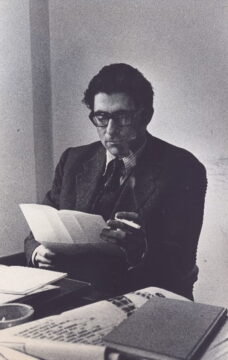Beatriz Silva in the Journal of the History of Ideas blog:
 “November is a mournful month in the history of Palestine,” Edward Said began his eulogy in memory of Sir Isaiah Berlin in 1997. With the news of Berlin’s passing came an outpour of newspaper articles written by the philosopher’s admirers, friends, and scholars, honoring the man who remains one of the major liberal thinkers of the Cold War. Said’s text, published in the pan-Arab newspaper Al-Hayat, went relatively unnoticed. In the first few paragraphs, the Columbia University professor remembers a man with whom he shared intellectual roots: a skilled orator and a philosopher with an astonishing breadth of knowledge that extended well beyond philosophy. The second part of the text takes an introspective turn, as Said confesses to the reader: “None of us [Palestinians]—and I do not excuse myself at all were able to engage with Berlin on the question of Palestine.” With this reflection, Said hints at an aspect of Berlinian scholarship that persists inadequately addressed: the British philosopher’s unwavering commitment to the state of Israel and, most importantly, his dismissal of the experiences of Palestinians since 1948. In highlighting what has tended to be written off as a mere footnote in Berlin’s life, Said suggests a re-evaluation of the Oxford don’s liberal theory by asking: who was Isaiah Berlin’s liberalism for?
“November is a mournful month in the history of Palestine,” Edward Said began his eulogy in memory of Sir Isaiah Berlin in 1997. With the news of Berlin’s passing came an outpour of newspaper articles written by the philosopher’s admirers, friends, and scholars, honoring the man who remains one of the major liberal thinkers of the Cold War. Said’s text, published in the pan-Arab newspaper Al-Hayat, went relatively unnoticed. In the first few paragraphs, the Columbia University professor remembers a man with whom he shared intellectual roots: a skilled orator and a philosopher with an astonishing breadth of knowledge that extended well beyond philosophy. The second part of the text takes an introspective turn, as Said confesses to the reader: “None of us [Palestinians]—and I do not excuse myself at all were able to engage with Berlin on the question of Palestine.” With this reflection, Said hints at an aspect of Berlinian scholarship that persists inadequately addressed: the British philosopher’s unwavering commitment to the state of Israel and, most importantly, his dismissal of the experiences of Palestinians since 1948. In highlighting what has tended to be written off as a mere footnote in Berlin’s life, Said suggests a re-evaluation of the Oxford don’s liberal theory by asking: who was Isaiah Berlin’s liberalism for?
The two intellectuals met for the last time at a London restaurant in 1996. “Unfailingly cordial,” as Said described Berlin’s treatment of himself, “he called out to me and insisted on chatting briefly with me about the eighteenth-century Italian philosopher Vico.” Berlin and Said’s shared interest in Giambattista Vico indicates that the two academics shared more in common than one might expect.
More here.
Enjoying the content on 3QD? Help keep us going by donating now.
